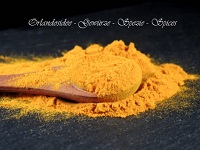
Turmeric (Curcuma longa)
Curcuma — dried and ground rhizome
Turmeric is the bright-yellow rhizome of Curcuma longa, related to ginger. After harvesting, the rhizomes are typically boiled or steamed, peeled, then sun-dried before being milled into powder. Most of the global crop is sold ground for consistent color and easy use.
- Botany: Curcuma longa • Family: Zingiberaceae
- Form: whole dried rhizome or ground powder (most common)
- Profile: warm, earthy, lightly woody with gentle bitterness; intense golden color
- Kitchen note: can stain utensils and fabrics—handle with care
Aroma & Taste
Turmeric smells peppery-earthy with a dry, woody warmth. A small amount adds depth and a vivid yellow hue without notable heat.
Culinary Uses
Essential in many curry powders and blends, chutneys and rice dishes. It’s widely used in dals, soups, vegetable sautés and marinades. In everyday Indian cooking turmeric often supplies color where saffron would be too costly—note the flavor is different.
See also our Madras curry blend for a classic use of turmeric in seasoning.
How to Use
- Bloom in fat: stir 1–2 pinches into warm oil/ghee for 10–20 s to open aroma, then add aromatics/liquid.
- Infuse in liquid: whisk directly into broths, coconut milk or rice water for even color.
- Finish carefully: a late pinch refreshes color; too much can taste chalky or bitter.
Dosage & Tips
- Soups/stews: 1/4–1/2 tsp per 1 l (4 cups) base.
- Rice: 1/4 tsp per cup of raw rice (rinse bowl promptly to avoid stains).
- Blends: 5–15% of a curry mix by weight, depending on style.
- Avoid scorching—add liquid shortly after blooming.
Pairings
Great with cumin, coriander seed, ginger, garlic, mustard seed, fenugreek, black pepper, chili, coconut milk, tomato, onion and citrus.
Ingredients & Allergens
Ingredients: Turmeric (Curcuma longa).
Allergens: none mandatory in EN labeling for this single ingredient.
Storage & Shelf Life
Store airtight, cool, dry and away from light to protect color and aroma. Best within 12–18 months. Whole fingers keep longer than pre-ground powder.
Substitutes & Notes
For color with a mild flavor: annatto or sweet paprika (different taste). For a saffron-like hue without saffron flavor, use a tiny pinch of turmeric—remember it won’t mimic saffron’s aroma.
FAQ
Why is my dish bitter?
Usually from using too much or frying the powder too hot/too long. Bloom gently and measure sparingly.
Can I use fresh turmeric instead of powder?
Yes—grate fresh rhizome (it’s juicier and brighter); start with about 2–3× the amount of powder and adjust to taste.
When should I add turmeric?
Early, during blooming or when adding liquids, for even color and a rounder flavor.
Merchant contact: Orlandosidee — Spice Shop (see site imprint for full company details). Email: info(at)orlandosidee.de



